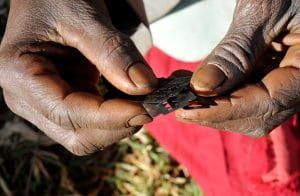Despite several campaigns against Female Genital Mutilation (FGM) in Nigeria, the practice persists because advocates continue to support the act despite laws criminalising it, writes Jumoke Olasunkanmi.
A practice that has lingered for generations, FGM is a deeply rooted cultural tradition that continues to affect the lives of countless girls and women. Supporters of FGM, such as Mrs Aisha Rufai, a 60-year-old woman, like many of her generation, was subjected to the practice, but she is more than happy to pass on the tradition to her children. Her belief? It curbs female promiscuity.
“I believe it helps girls control their sexual desires and reduces sexual urge, so when a girl is circumcised, she will not be sexually active at a young age,” she told African Health Report (AHR).

When asked if she knew there is a law criminalising circumcision of a girl child (FGM), she replied no and further explained that she did not believe that people should go to jail for mutilating a child.
“I have not heard of any law against genital mutilation and I don’t think people should do jail time for circumcising their children,” she declared.
Some people may excuse Rufai’s perspective to influences from her generation but the same cannot be said of Miss Favour Ogbodo, a young woman below 30 years who didn’t want her picture attached in this report, agrees that the tradition has a role in controlling sexual desires.
“I believe that circumcision helps to curb promiscuity as women who are not circumcised may get uncontrollably urges and eventually cheat on their husbands,” she said, while adding that she would not be passing on the tradition to her daughters as it is now illegal.
The position of Rufai and Ogbodo reflect the fact that FGM in Nigeria is far from over because it is driven by deep-rooted beliefs; a complex intersection of culture and tradition. While progress has been made in the fight to eradicate this practice, the larger issues it represents continue.
For Ms. Adedapo Kharima, a school counselor at Lagos state-owned Gberigbe Community Junior Grammar School, FGM is an unnecessary and dangerous practice with no known benefits.
“Female genital mutilation is unnecessary and dangerous. Not only does it cause physical harm but also causes mental harm and esteem issues,” she stated with emphasis that contrary to myths, FGM does not curb promiscuity and whoever is convicted of promoting or engaging in the act itself should be jailed as stipulated by the law.

4.3 million girls at risk of FGM
A 2023 UNICEF data showed that over 200 million girls have undergone FGM and 4.3 million girls are at risk of genital mutilation. This number is estimated to grow to 4.6 million by 2030. FGM is an invasive procedure where the female genitals are cut, injured, or changed. It is usually done to young girls from infancy to age 15 or before the onset of puberty.
Often performed by traditional circumcisers without medical training or care for sanitary or safety measures, FGM is wrongly believed to curb promiscuity among girls but remains prevalent in Nigeria despite campaigns by government and non-governmental organisations.
In 2018, Nigeria Demographic and Health Survey revealed that 86 percent of girls were mutilated before the age of 5. While this number has reduced to 15 percent among women aged 15 to 49 and 8 percent among girls aged 0 to 14 in 2021, according to the 2021 Multiple Indicator Survey (MICS), it is still alarming as Nigeria accounts for the third highest number of girls and women who have undergone FGM globally with 19.9 million survivors.
FGM practice in Nigeria can be grouped into four: Clitoridectomy also known as Type I is the removal of part or all of the clitoris. In Nigeria, it is usually done by cutting a part of the clitoris.
Type II also called ‘Sunna’ involves the removal of the clitoris as a whole alongside parts or all of the labia minora. to
Type I and II are the most common form of mutilation in the country with prevalence in the South-South, South East and South West.
Infibulation or Type III commonly practiced in the North is the most severe form of mutilation and it involves the removal of the clitoris, the labia minora, part of the labia majora and narrowing the vagina opening.
Other forms of mutilation including piercing, scraping, pricking, or burning are classified as Type IV.

Strong Laws, Poor Implementation
Despite the fact that FGM has been asserted by law to be a violation of women’s rights due to its numerous health implications, this practice, rooted in misogyny, gender inequality, and power imbalance persists.
Section 34 of the 1999 constitution states that “no person shall be subjected to any form of torture, inhuman or degrading treatment or punishment”. Genital mutilation definitely falls under torture and inhuman treatment.
The Child Rights Act (CRA), passed in 2023, also echoes this provision stating “no child shall be subjected to any form of torture, inhuman or degrading treatment or punishment”. This act is however only applicable in 23 states including the Federal Capital.
While both laws do not expressly mention female genital mutilation, the Violence Against Persons Prohibition Act (VAPP) Act signed by the Goodluck Jonathan administration in 2015 specifically categorised FGM as a criminal offense. Section 6 of the VAPP Act provides for a set of punishments for FGM.
“Anybody who performs or engages another to perform FGM on any person is liable to a term of imprisonment not exceeding 4 years or to a fine not exceeding N200,000 or to both.
Anybody who attempts, aids, abets, or incites another to carry out FGM is liable to a term not exceeding 2 years imprisonment or to a fine not exceeding N100,000 or to both.”
However, other states like Lagos, Osun, Ondo, Ekiti, Bayelsa, Ogun, Delta, Ebonyi, Oyo, Imo, Edo, Cross River, and Rivers State have laws that forbid FGM in their states.
It is however concerning that the VAPP Act is not applicable in all states as it has not been domesticated by many states in the country. In fact, as of 2018, the Act was only applicable in Anambra state and the FCT. Consequently, eight years after passing the VAPP Act into law, there has not been any FGM conviction in the country despite the prevalence of the practice.

Obstruction of Vaginal Opening, Psychological problems, Other Health Implications Linked to FGM
As FGM is usually done by non-medical personnel, the procedure is not always safe and may lead to infections which may cause hemorrhage and death. Although data on the mortality rate due to FGM is hard to get, a study in the National Library of Medicine estimates that 1 out of every 500 circumcision results in death.
Even when mutilation is done by medical personnel, it is still not safe or bereft of long-term complications. FGM predisposes women to chronic genital infections with consequent chronic pain, vaginal discharge, itching, cysts, abscesses, and genital ulcers which may in turn lead to recurring reproductive tract infections.
Obstruction of the vaginal opening may lead to painful menstruation (dysmenorrhea), irregular menses, and difficulty in passing menstrual blood, particularly among women with Type III FGM, according to the World Health Organisation (WHO).
Additionally, FGM damages anatomic structures that are directly involved in female sexual function and can therefore also have an effect on women’s sexual health and well-being. Removal of, or damage to, highly sensitive genital tissue, especially the clitoris, may affect sexual sensitivity and lead to sexual problems, such as decreased sexual desire and pleasure, pain during sex, difficulty during penetration, decreased lubrication during intercourse, and reduced frequency or absence of orgasm (anorgasmia).
WHO further explains that FGM is associated with an increased risk of cesarean section, postpartum hemorrhage, recourse to episiotomy, difficult labour, obstetric tears/lacerations, instrumental delivery, prolonged labor, and extended maternal hospital stay.

This is consistent with Ms Olasunkanmi Jumoke’s experience. She told AHR in an interview that she had her child through cesarean section in 2022 due to vaginismus that her doctors believed was as a result of genital mutilation.
WHO further noted that FGM may be linked to mental health problems as studies have shown that girls and women who have undergone FGM are more likely to experience post-traumatic stress disorder (PTSD), anxiety disorders, depression, and physical complaints like aches and pains with no organic cause.



